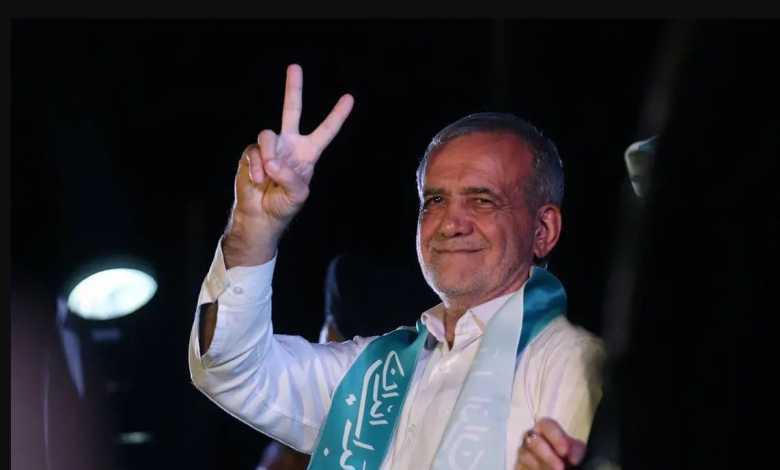In the early hours of July 6, 2024, the Iranian Election Commission declared reformist candidate Masoud Pezeshkian as the winner of the country’s fourteenth presidential election. Pezeshkian now joins the ranks of the Islamic Republic’s presidents as its ninth leader and the third reformist to hold the office, following Muhammad Khatami (1997–2005) and Hassan Rouhani (2013–2021).
Pezeshkian garnered 16,384,403 votes, surpassing the fundamentalist candidate Saeed Jalili, who received 13,538,179 votes. Voter turnout in the second round was 49.8%, a notable increase from the 40% turnout in the first round held on June 28.
Contrary to widespread expectations favoring Saeed Jalili, given the fundamentalist movement’s stronghold over Iran’s key political institutions, Pezeshkian’s victory marks a significant shift with potential ramifications for both domestic and foreign policy.
Impact of Pezeshkian’s Victory on Domestic Politics in Iran
The most significant impacts of Pezeshkian’s victory on domestic politics in Iran can be outlined as follows:
Revival of the Reformist Movement: Pezeshkian’s triumph marks the resurgence of the reformist movement in Iran’s political landscape after a three-year hiatus following former President Ebrahim Raisi’s tenure. During Raisi’s presidency, many reformist leaders retreated from key political positions dominated by fundamentalists. Pezeshkian’s win signals a renewed competition between reformists and fundamentalists, especially as the latter still control many influential political roles.
Calming Internal Tensions Amid Economic Hardships: Pezeshkian’s victory is likely to soothe Iranian citizens disillusioned with the domestic policies of former President Ebrahim Raisi, particularly on contentious issues like women’s rights and the mandatory hijab. His win rekindles hope for economic improvement, as the reformist approach leans towards openness and engagement with Western countries, in stark contrast to the fundamentalist agenda.
The regime likely needs to pacify the domestic front, especially since recent signs indicated potential widespread protests if Pezeshkian had lost, particularly after he secured over 10 million votes in the first round, compared to Jalili’s 9 million. Pezeshkian’s victory, therefore, presents an opportunity to stabilize the internal political climate.
A Peaceful Transition to a New Era: With Iran on the brink of entering the post-Khamenei phase, the regime faces the urgent task of pacifying the streets and steadying the political environment. The rise of a reformist president could significantly enhance political stability and prevent local disruptions, particularly if reformists succeed in negotiating a nuclear agreement and achieving economic progress in the upcoming months.
The Impact of Pezeshkian’s Victory on Iranian Foreign Policy
At a foreign policy level, the most notable impacts of Pezeshkian’s victory on Iran’s regional and international foreign policy can be summarized as follows:
Continuing Rapprochement with Middle Eastern Countries: Pezeshkian has repeatedly emphasized his commitment to strengthening ties with neighbouring countries in the Middle East. This sentiment has been echoed by other Iranian institutions, particularly after the death of former President Ebrahim Raisi on May 19, 2024. The commitment to this policy indicates no major shifts in regional diplomacy.
However, the question remains: Will Pezeshkian maintain the same pace and vigor as the previous administration, or will his government prioritize relations with Western countries over Eastern ones?
Enhancing Relations with the United States and Europe: Reformists have a well-known penchant for opening up to the West, including the United States and Europe. This suggests a potential thaw in Iranian-US and Iranian-European relations in the coming months. Such a shift could pave the way for increased Western investments in Iran, reminiscent of the economic opportunities seen during former President Hassan Rouhani’s term (2013-2021).
Increased Prospects for a Nuclear Agreement: With Masoud Pezeshkian’s victory, the likelihood of reaching a nuclear agreement with major world powers appears more promising. Reformists are generally seen as more pragmatic and less extreme at the negotiating table, unlike the fundamentalists, who, under President Raisi, engaged in protracted yet fruitless discussions with the West for over two years in Vienna. Pezeshkian’s presidency brings renewed optimism for diplomatic progress.
Notably, former President Rouhani managed to secure a nuclear deal in a much shorter timeframe, highlighting the reformists’ effectiveness in such diplomatic efforts.
Unchanged Policy towards Proxies and Conflict with Israel: Despite these potential shifts, Iran’s approach to its regional proxies in Iraq, Lebanon, and Syria is expected to remain consistent. This is primarily because the military and security services control these policies. However, Iran might seek to de-escalate tensions on these fronts temporarily to avoid destabilizing its internal political, security, or military situation, especially as it prepares for the post-Khamenei era. The same applies to Iran’s conflict with Israel, which remains under the purview of these security apparatuses.
Conclusion
Masoud Pezeshkian’s victory breathes new life into the reformist movement, bringing it back to prominence in Iran’s political landscape after a three-year absence. This resurgence not only revitalizes the reformists but also promises to bring much-needed stability to the political scene, as reformists and fundamentalists are likely to be preoccupied with their renewed rivalry.
On the foreign policy front, significant changes are not expected, particularly regarding Iran’s regional proxies, its relationship with the United States, and the ongoing conflict with Israel. Iran has confirmed its continued commitment to rapprochement with Arab and Middle Eastern countries.
In the meantime, the likelihood of reaching a nuclear agreement with major powers is set to increase, particularly after the US presidential elections in November 2024. A closer alignment with European countries is also anticipated, paving the way for enhanced diplomatic and economic relations.













